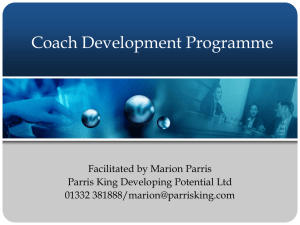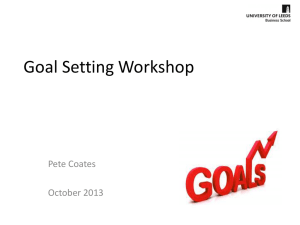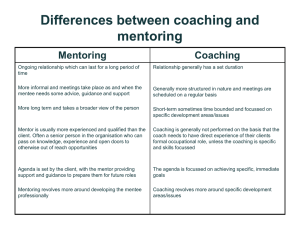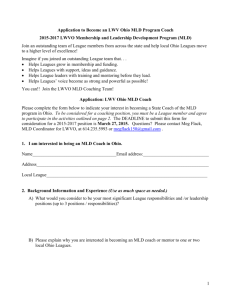Developing Leaders within the League
advertisement
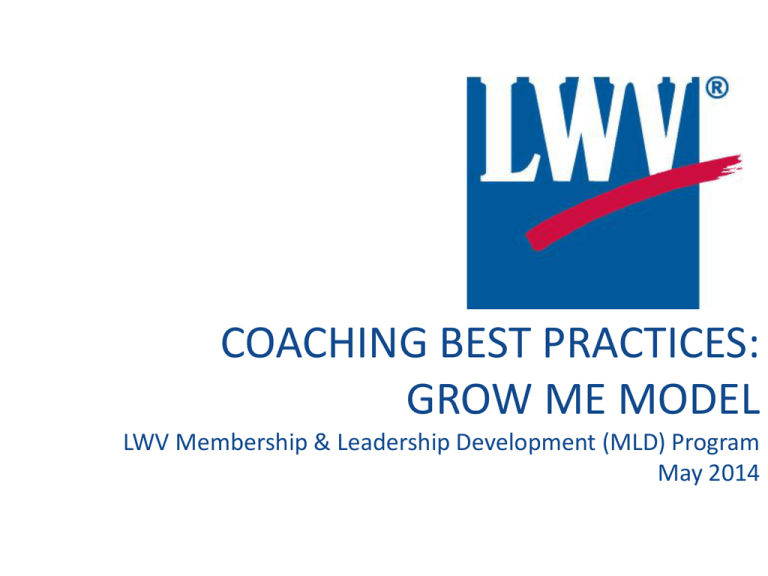
COACHING BEST PRACTICES: GROW ME MODEL LWV Membership & Leadership Development (MLD) Program May 2014 Today’s Agenda Housekeeping items Coaching? In League? Introduction to GROW ME coaching model Best practices Taking it back… Q&A Housekeeping items •Lines will be muted. •Please “raise hand” with question or when you want to speak. •Identify yourself (name and local League). •Use the “chat” function for questions and feedback. Coaching? In League? How can we support League leaders? How do we help to set individuals up to succeed? How do we create maximum impact as an organization? The growth of coaching practices is attributable to a new focus on organizational leadership development. Organizations with powerful leadership development practices consistently produce desirable long-term results. When coaching is an effective element of an organization's leadership development strategy, long-term improvements--measured by profit, cost--containment, or both--are the likely business outcomes. -Getting Value from Coaching: Organizations improve their leadership development ROI when coaching links directly to the strategy and performance. by Mike Horne, Ph.D Coaches are key... Role of a Coach Clarity of expectations: • Guide • Inform • Cheerlead • Mentor What is the key to success? ASKING THE RIGHT QUESTIONS Powerful questions = Powerful answers Why Ask? Questions hold the power to cause us to think, create answers we believe in, and motivate us to act on our ideas. Asking moves us beyond passive acceptance of what others say, or staying stuck in present circumstance, to aggressively applying our creative ability to the problem. 5 Reasons to Ask 1. All the info is with the coachee. The local League is the resident expert on that League. The coachee always knows far more about the situation than the coach. 2. Asking creates buy-in. People are more motivated to carry out their own ideas and solutions. 3. Asking empowers. Just asking can empower people to do things they couldn’t do on their own. Asking = taking opinions and ideas seriously. 4. Asking develops leadership capacity. Asking builds the responsibility muscle and that develops leaders. 5. Asking creates authenticity. There is no greater relational gift than to have someone see the real you and value it. So many models, so little time… “Conversational Coaching” • Setting an agenda • Defining the problem • Creating a goal • Exploring and developing options • Address obstacles • Take action GROW Model • Most common or best known model • Just a way to organize or structure the conversation • Focuses on concrete action so it is a good model for getting “practical things” done Goal Reality Check Options Will Goal What do we want to accomplish? - Clear, specific Sample questions: • What specifically do you want to accomplish? • By when do you want to have this done? • What will be different as a result of working on this? • How will we know when we’ve achieved it? Reality Check How are things now? - Concrete facts about present situation - Understanding our starting point Sample questions: • What have you tried already? • Who else is involved in this situation/goal? • What is the situation right now? Options What are the potential solutions? - Think creatively; listen don’t suggest Sample questions: • What are five potential solutions? • If you had unlimited resources, what would your try? • Who else can help? • What have you seen others do that might work for you? Will How can we turn our preferred “option” into action steps? - Concrete plans; high “buy-in” Sample questions: • Which option do you want to pursue? • What step could be taken this week? This month? • What will you commit to doing? • Who else will we enlist? Is it higher than an 8? Coaching is not always linear, but we can try to add some definition. • If the perfect outcome is a 10, where are we now? • On a scale of 1 to 10, what’s the motivation to do this? 0 1 2 3 4 5 6 7 8 9 10 The “M” and the “E” Monitor progress Evaluate Sample questions: •What do you need to track to assess progress? •Who is responsible for collecting/reporting data? •What tool will facilitate your monitoring and evaluation practices? •What is your “story of success”? What does this look like… SCENARIO: Every other year, we hold a candidate forum for the state representative candidates for our district. We want to increase the number of League members involved in planning and executing this event. Goal Reality Check Options Will GROW ME What are our coaching questions? How do we get to the action steps? How do we monitor progress or success? What other resources might be used or needed? What does this look like… SCENARIO: At the same event, we want to increase public attendance. Goal Reality Check Options Will Practical applications… Small wins are motivating. What’s the smallest change that we can make to have the biggest impact? Coaching Agenda • • • • OWNERSHIP: Local League’s own idea. PASSION: Motivated to pursue it. URGENCY: Need to act now! SIGNIFICANCE: Will make a real difference and worth sacrificing for. Use O.P.U.S. to help you remember. Heart of the MLD Program With the support of a coaching structure, capacity building for high impact. Member recruitment & retention Leadership development Questions? Contact Us • Carol Reimers (reimersc@aol.com) • Kelly McFarland Stratman (kmcfarland@lwv.org) • More information about MLD program: membership@lwv.org


